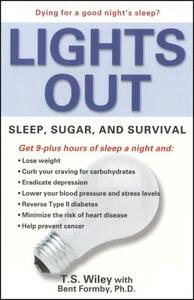Take a photo of a barcode or cover
The text on the cover about how crucial sleep is to one's health and happiness drew me in. If I can feel well just by sleeping more, count me in. I practice CrossFit and eat paleo as much as possible, so sleeping in circadian rhythm makes sense. The narrative of the book is quite abysmal, but the science is pretty interesting. The authors claim that our low-fat, high-carbohydrate diet is unhealthy. Further, the stress of our exercise routines and long work days and late nights really mess with our brain chemistry. This was a valuable read that I would recommend to anyone who struggles with weight loss, depression, high blood pressure, Type II diabetes, heart disease, or cancer.
Поредната шарлатанска книга, която се опитва да ни убеди, че е открила тайната на здравето.
Половината от обема й се състои от бележки и референции, което си е подозрително само по себе си, а става още по-подозрително като видиш, че референциите като цяло не подкрепят това, което пише в нея, а просто ей така са "цитирани" за да предадат тежест на казаното.
Половината от обема й се състои от бележки и референции, което си е подозрително само по себе си, а става още по-подозрително като видиш, че референциите като цяло не подкрепят това, което пише в нея, а просто ей така са "цитирани" за да предадат тежест на казаното.
Lights Out: Sleep, Sugar, and Survival was one of the first books I read about the power of sleep. I read it when it first came out in 2002 after it was suggested to me by a friend. I finished it again recently and the information in this book is still as relevant as it was back then.
This was the book that hammered home how important sleep is and how sick the majority of people are from being exhausted. We are dying for sleep. I've read countless books since reading this book in my own personal pursuit for sleep and I still keep coming back to the facts listed in this book from the National Institutes of Health.
Diabetes, cancer, depression and autoimmune illnesses were all listed as 'on the rise' in 2001 when this book was published, and T.S. Wiley's predictions have proved to be true.
The theory presented in Lights Out: Sleep, Sugar, and Survival is that our lives changed drastically with the invention of the lightbulb. Artificial light allowed humans to become more active at times of the day and night when we would naturally be sleeping.
Before the invention of the lightbulb, we got up in the morning and went to bed with the rising and setting of the sun, but in today's world, we stay up far past what our bodies are meant to do.
We are relying on artificial light until 11pm at night or later, but our biological rhythms haven't had a chance to catch up. We fool our bodies into thinking it's summer year-round. We spent our time at the gym working out until late at night or go to bars with pulsing lights and music that aren't things our bodies were naturally adapted to.
Consequently, statistics have shown that this lack of sleep that we all suffer from results in all sorts of problems, including heart problems, diabetes, cancer, infertility, mental illness, autoimmune illnesses, sleep disorders, and much more.
Wiley also writes a lot about why diets that are rich in carbohydrates are ineffective and bad for our health, and what we can do to turn things around to improve our health.
This was the book that hammered home how important sleep is and how sick the majority of people are from being exhausted. We are dying for sleep. I've read countless books since reading this book in my own personal pursuit for sleep and I still keep coming back to the facts listed in this book from the National Institutes of Health.
Diabetes, cancer, depression and autoimmune illnesses were all listed as 'on the rise' in 2001 when this book was published, and T.S. Wiley's predictions have proved to be true.
The theory presented in Lights Out: Sleep, Sugar, and Survival is that our lives changed drastically with the invention of the lightbulb. Artificial light allowed humans to become more active at times of the day and night when we would naturally be sleeping.
Before the invention of the lightbulb, we got up in the morning and went to bed with the rising and setting of the sun, but in today's world, we stay up far past what our bodies are meant to do.
We are relying on artificial light until 11pm at night or later, but our biological rhythms haven't had a chance to catch up. We fool our bodies into thinking it's summer year-round. We spent our time at the gym working out until late at night or go to bars with pulsing lights and music that aren't things our bodies were naturally adapted to.
Consequently, statistics have shown that this lack of sleep that we all suffer from results in all sorts of problems, including heart problems, diabetes, cancer, infertility, mental illness, autoimmune illnesses, sleep disorders, and much more.
Wiley also writes a lot about why diets that are rich in carbohydrates are ineffective and bad for our health, and what we can do to turn things around to improve our health.

